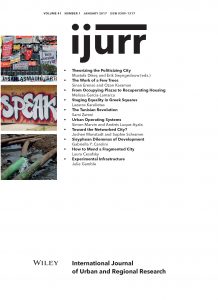This article engages in the debate on urban contentious politics by returning to the Tunisian revolution. In the article, I chart movements provoked by neoliberal restructurings, and show how these ultimately came together to form a mass movement demanding radical political change. I first describe the socio-spatial roots of the Tunisian revolution to understand its dynamics. Based on the chronology of the unfolding events I sketch the classes, social groups and movements that coalesced against authoritarian rule in early 2011. Although the Tunisian revolution started in rural environments, I focus more specifically on the role of urban social movements in the uprising to link questions of urbanism to what were clearly national revolts. Secondly, I outline the scope of neoliberal reforms in Tunisia by looking at the impact of these reforms to chart the resulting emergence of contentious politics in response to the increasing violence that characterized all levels of economic life during this period. I also consider the resulting uneven development and the changing relations between the state and the different social classes. This enables me to reflect on the politicization of the city with the aim of opening up new opportunities for engaging with a more comparative and cosmopolitan theory about cities around the world.

